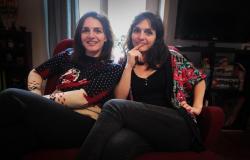En 2020, Consent, Vanessa Springora’s first book, made a splash on the literary scene as well as throughout France, then throughout the world – it was translated into 22 languages. It recounted the emotional influence and sexual violence exerted on her, the year she turned 14, by the writer Gabriel Matzneff, who sang of child crime under the complacent eye of the cultural, political and media world.
Every Wednesday at 4 p.m.
Receive the cultural news of the week not to be missed as well as Surveys, decryptions, portraits, trends…
Merci !
Your registration has been taken into account with the email address:
To discover all our other newsletters, go here: MyAccount
By registering, you accept the general conditions of use and our confidentiality policy.
In this book there was a father, Patrick. Toxic, mythomaniac, he was in Consent a distant satellite, a black star shining by its absence. Here it is, in Surnameentering the light with all its dark side. In 2020, Consent has just been published. After ten years of silence, Patrick Springora sends his daughter a congratulatory text. She doesn’t follow up. A few days after the release of her book, she received a phone call: her father had died in the tiny apartment where he had lived for almost a quarter of a century.
The place is extremely gloomy, his father suffered from Diogenes syndrome and accumulated everything: trash, souvenirs, filth. Only child, Vanessa Springora must empty everything. Here she comes across two photos that leave her speechless: her beloved late grandfather, Joseph, of Czech origin, appears there at a very young age, in a Nazi uniform. Memories repressed from childhood come back, notably that of his father mechanically scribbling, while he speaks on the telephone, the face of Hitler and swastikas on a piece of paper.
The shadow of Nazism hangs over the Springora name, but what crime exactly are we talking about? In what atrocities did Joseph take part, what quantity of blood came to stain this “proper” name on which the author began to investigate, with determination, traveling as far as Moravia, where the family has its roots ? Questioning the family enigma, pursuing both the figure of the father and the grandfather, Vanessa Springora sheds light on a whole section of History (notably that of the Sudetenland, this territory which was successively German and Czech), tells how Nazism , then communism tore apart and reshaped destinies and families.
To Discover
Kangaroo of the day
Answer
She digs into the psyche of this father, intoxicated by the poison of secrecy, a fan of bluster to the point of becoming unapproachable, consumed by a homosexuality that he lives in secret. Her style is polymorphous, of a transfixing lucidity when she plunges into herself, astringent when she paints the portrait of her father, lively when she slips into other skins to fill in the faults of a past which slips away as soon as possible. that she thinks she has finally figured it out. “This story is not over, I feel it », she writes at the end of Surname. We feel it, too: the person who published this magnificent text still has a lot to offer French literature.
Surnameby Vanessa Springora (Grasset, 364 p., €22)






